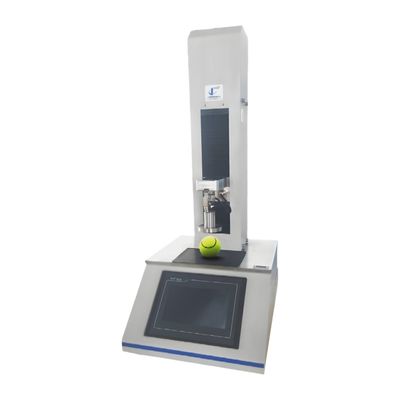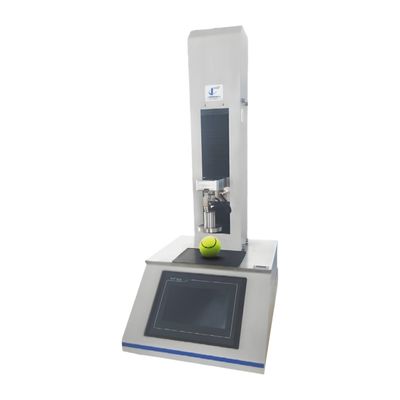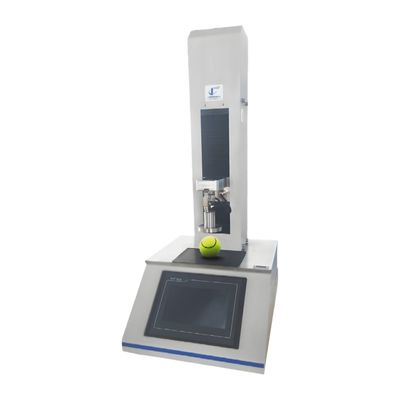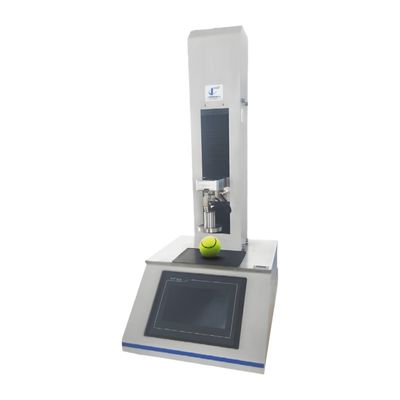Tennis Ball Compression Tester – Ensuring Ball Consistency per ITF & GBT 20045
| Test Range | 20kg | Stroke | 250 Mm (without Plates) |
|---|---|---|---|
| Speed | 1–500 Mm/min (adjustable) | Displacement Accuracy | +/-0.01mm |
| Resolution | 0.01N | Force Accuracy | ±0.5 % F.S. |
| Plate Diameter | 70mm(up To 100mm) | Control & UI | PLC + 7″ HMI Touchscreen |
| Data Output | Screen, Microprinter (opt.), RS‑232 (opt.,PDF Export) | Power | AC 110~220V 50/60Hz |
Tennis Ball Compression Tester
The Tennis Ball Compression Tester is a vital instrument in the quality evaluation of tennis balls, ensuring that every ball used in training or professional matches meets the precise deformation and resilience standards set by the International Tennis Federation (ITF) and GBT 20045. The test determines whether a tennis ball’s compression and rebound characteristics comply with international requirements, guaranteeing consistent playability and fair competition.
As a leading manufacturer of material testing instruments, Cell Instruments provides advanced testing solutions such as the TBCT-01 Tennis Ball Compression Tester, designed to deliver accurate, repeatable, and reliable results for sports equipment manufacturers and quality inspection agencies.
Importance of Tennis Ball Compression Testing
![]()
Tennis ball performance is largely determined by its compression—the degree to which the ball deforms under a specific load. If a ball is too hard, it may bounce excessively, whereas a soft ball may fail to rebound properly. Therefore, compression testing is essential for ensuring uniform performance across batches and compliance with ITF rules of tennis and GBT 20045 specifications.
These standards specify both forward deformation and return deformation, which measure how much the ball compresses and how effectively it regains its original shape after being subjected to force. By performing these tests, manufacturers can guarantee that each ball maintains the perfect balance between durability, elasticity, and playability.
Tennis Ball Deformation Tester and ITF Test Method
The Tennis Ball Deformation Tester, also referred to as the Tennis Ball Compression Tester, is typically based on the ITF Test Method TB 03/01, which defines how deformation measurements should be carried out. According to this method, a modified Stevens Machine or an equivalent apparatus applies a compressive force along the ball’s diameter.
Before testing, each tennis ball undergoes pre-compression—compressed three times on each of three perpendicular axes (a total of nine times). This step eliminates any “set” in the ball’s structure, ensuring that the subsequent readings reflect the true mechanical response.
During the test, the ball is placed between two rigid platens—one fixed and one movable. The movable platen applies a predetermined force, and the deformation of the ball is measured. The results are compared against ITF standards to determine if the ball meets the approved compression range.
Key Parameters and Reference Standards
The GBT 20045 standard, corresponding to the ITF rules of tennis, outlines the specific requirements for tennis ball size, deformation, and mass. A ball must pass through and fail to pass through specific ring gauges under its own weight to ensure dimensional accuracy:
-
Type 1 & 2 Balls: Must pass through a 6.86 cm ring and not pass through a 6.54 cm ring.
-
Type 3 Balls: Must pass through a 7.30 cm ring and not pass through a 7.00 cm ring.
-
Stage 1 (Green) Balls: Must pass through a 6.86 cm ring and not pass through a 6.30 cm ring.
For deformation, the ITF specifies limits for forward deformation (compression under load) and return deformation (recovery after load release). These values ensure that all tennis balls exhibit consistent elastic performance.
Advanced Testing with Cell Instruments TBCT-01
The Cell Instruments TBCT-01 Tennis Ball Compression Tester is engineered to meet both GBT 20045 and ITF deformation test requirements. It features:
-
Precision Force Control: Ensures accurate compression force application.
-
High-Resolution Deformation Measurement: Enables precise assessment of forward and return deformation.
-
Automatic Data Processing: Provides instant calculation and display of test results.
-
User-Friendly Interface: Simplifies operation for laboratory technicians and production personnel.
Mian Parameter
| Test Range | 20kg |
| Stroke | 250 mm (without plates) |
| Speed | 1–500 mm/min (adjustable) |
| Displacement Accuracy | +/-0.01mm |
| Force Accuracy | ±0.5 % F.S. |
| Plate Diameter | 70mm(up to 100mm) |
| Control & UI | PLC + 7″ HMI touchscreen |
| Data Output | Screen, microprinter (opt.), RS‑232 (opt.,PDF export) |
| Power | AC 110~220V 50/60Hz |
By adopting the TBCT-01, tennis ball manufacturers can significantly improve production consistency, product certification success rates, and quality assurance efficiency. The instrument’s reliability makes it suitable for research laboratories, sports equipment manufacturers, and official testing institutions.
Why Choose Cell Instruments?
With years of experience in materials and sports equipment testing, Cell Instruments has become a trusted global partner in precision testing technology. We specialize in customized testing systems and automation solutions, ensuring that every client receives an instrument tailored to their specific requirements.
Our instruments, including the Tennis Ball Compression Tester, are built to comply with the latest international standards and deliver high measurement accuracy, long service life, and intuitive operation.
Conclusion
A Tennis Ball Compression Tester plays a crucial role in maintaining the integrity and fairness of tennis competitions. By aligning with GBT 20045 and ITF rules of tennis, manufacturers can ensure that every ball performs consistently under real game conditions. The TBCT-01 from Cell Instruments combines precision engineering, advanced control systems, and compliance with international standards—making it the ideal choice for comprehensive tennis ball deformation and compression testing.
![]()






